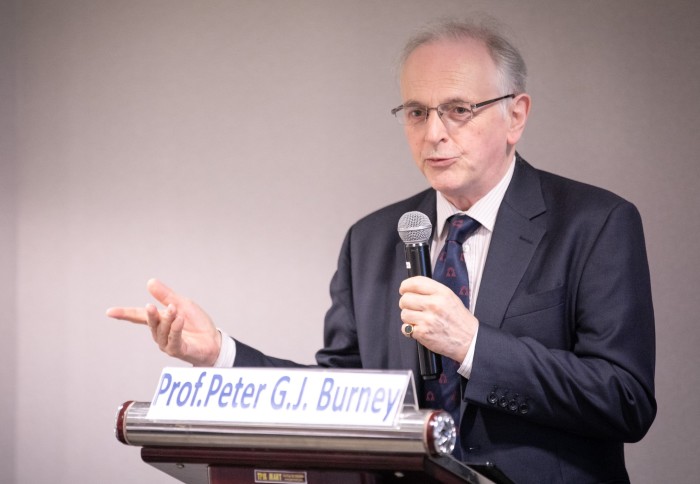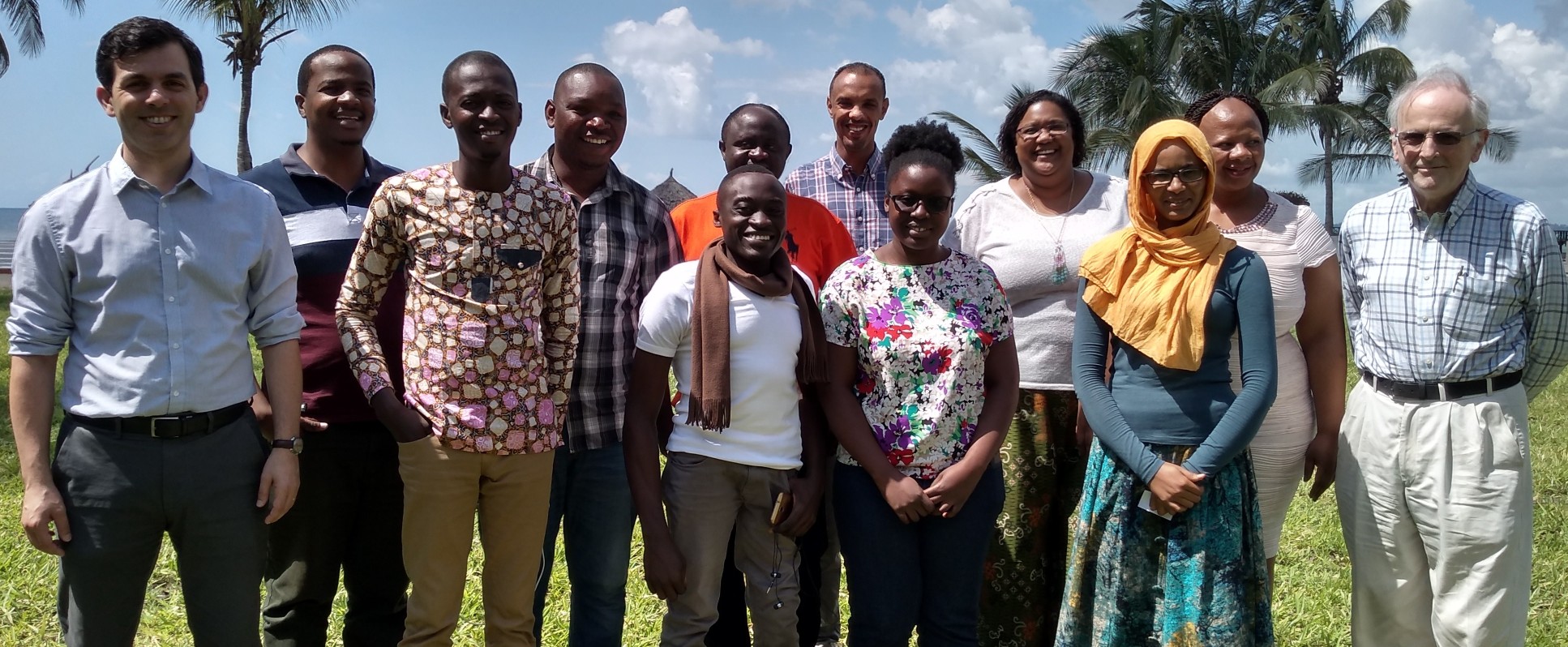Professor Peter Burney takes Emeritus status following 40 year career

Professor Peter Burney takes Emeritus status from 30 March 2021 after a long and distinguished career of more than 40 years.
As Peter Burney MA MD FRCP FFPHM FMedSci, Professor of Respiratory Epidemiology and Public Health, moves to emeritus status his colleagues look back at his illustrious career, which included 15 years with the National Heart and Lung Institute (NHLI).
“Peter is a remarkable man and a charismatic leader. I’ve always admired him for his strength of character and kindness, and working with him has been one of the biggest pleasures in my professional life." Dr Cosetta Minelli
Having studied history at University of Oxford, Peter embarked on his medical training at the Middlesex Hospital Medical School then moved into public health at St Thomas Hospital Medical School. In 1995 he was appointed to the Chair in Public Health Medicine at United Medical and Dental Schools of Guys and St Thomas’, subsequently becoming head of the Division of Public Health and Primary Care at King’s College following the merger. In the same year he became director of the Department of Health funded Social Medicine and Health Services Research Unit. In 2006 he moved to the NHLI as Professor of Respiratory Epidemiology and Public Health.
A reputation for collaboration
Peter's early studies included a population based survey in Blandford Forum which provided seminal works on the epidemiology of bronchial reactivity and its relationship with salt intake. He used the then very limited hospital admission data to report variation in asthma admission rates across England, and mortality data to describe trends in asthma mortality. Peter soon extended his work to very large multi-centre, multinational population based surveys. He quickly established an international reputation for leading major international research data collaborations in which research centres apply standardised methodologies for sampling, data collection, lung function assessment and data analysis. These efforts include the European Community Respiratory Health Survey, the Burden of Obstructive Lung Disease, the GA2LEN epidemiological study and EUROPREVALL survey. These efforts extend across the globe and he has been amongst the first to establish enduring research collaborations with multiple partners in low and middle income countries.
While driving these projects through he has earned the admiration and respect of all those working with him. He has contributed to multiple committees over the years including holding long running membership of the Department of Health’s Scientific Advisory committee, the Committee of Medical Aspects of Air Pollution.
We asked Professor Burney’s colleagues for their reflections on Peter and his many contributions to scientific research.
The best sort of academic
“I have known Peter Burney for rather longer than either of us would like to say” recalls Professor Bill Cookson. “I first came to be aware of his presence at a meeting of the British Thoracic Society in 1985, where he regaled the audience as to the potential links between salt and asthma, whilst wearing a bow-tie and a double breasted blazer. Peter has always been a gentleman, and to me has been the best sort of academic, erudite and interesting about the world at large, always sceptical and challenging of received scientific orthodoxy, asking only that his informed views be taken seriously. I have always admired how he led and organised huge collaborations, with great kindness and forgiveness of colleagues less inclined than himself to be team players”.
"Working with Peter Burney over the years has been the greatest privilege” says Professor Debbie Jarvis. “Over thirty years ago, the night before I went for my interview to join his team as an Academic Public Health Trainee, I phoned him to tell him it was only fair he knew that I had just discovered I was pregnant. He still gave me the job - although appointing someone knowing they would soon be having a child was a bit of a novelty for the HR department!”.
King of charisma
Professor Peter Barnes comments ”It has been a great pleasure to know Peter over many decades. His lecture on the epidemiology of asthma in the ‘Pharmacology of Asthma’ course at NHLI was always very popular and I was delighted when he was recruited to join us over 15 years ago. During his career he has made outstanding contributions to population studies in asthma and more recently in COPD, so is rightly crowned the king of airway disease epidemiology. He delivers his lectures in an assured, amusing and very English style that conveys the depth of his knowledge. I congratulate him on his emeritus status!”.
Dr Cosetta Minelli adds “Peter is a remarkable man and a charismatic leader. I’ve always admired him for his strength of character and kindness, and working with him has been one of the biggest pleasures in my professional life. His wit, alongside his deep and broad scientific knowledge, make discussing research with him exciting. Outside work Peter never stops surprising me, whether listening to his stories on Dr Johnson’s 18th century London, or discovering an ancient pot in the British Museum that he found in an archaeological dig in his eventful youth”.

Oracle of advice
“I first met Peter in 1992 when I moved from the University of Southampton to St Thomas’s Hospital, UMDS” says Professor Frank Kelly. “Peter’s office was at the far end of the hospital and I remember enjoying the walk along the Thames corridor reflecting on the history of this great hospital. At the time I was expanding my interest in the possible impacts of air pollution on respiratory health and Peter was an ideal sounding board. Although I never quite convinced him of its importance, I have, it seems, followed in his footsteps from UMDS to King’s College London and now to Imperial. So, much respect Peter, your contributions to Respiratory Science have moved the field forward enormously”.
Professor Majid Ezzati writes “Although I have known Peter for less than 15 years, he has had a tremendous influence on my work and my career. Scientifically, Peter’s encyclopaedic knowledge of health and medicine and his ability to see the pieces and the whole at the same time, are a resource I have turned to many times. Personally, Peter was instrumental in my move to London and has supported me during and after the move as a gracious colleague and generous friend. We have settled in London and at Imperial better and more enjoyably thanks to Peter”.
Dr Andre Amaral comments “Peter has been my line manager, mentor, and colleague. I have learned a lot from him over the years (and still do) but particularly from chatting in our free time during training workshops in India, Morocco and Tanzania when setting up the Burden of Obstructive Lung Disease follow-up study. He is a fascinating person and truly knowledgeable on many topics, not just in the field of epidemiology and public health but also history, geography, politics, and cultural affairs”. Andre continues “Peter is highly respected and loved by everyone who has worked with him in the UK and overseas. I am lucky to have met Peter and I am extremely grateful for all the opportunities he gave me and the trust he put in me on several occasions”.
Article text (excluding photos or graphics) © Imperial College London.
Photos and graphics subject to third party copyright used with permission or © Imperial College London.
Reporter
Debbie Jarvis
National Heart & Lung Institute
Ms Helen Johnson
Communications Division